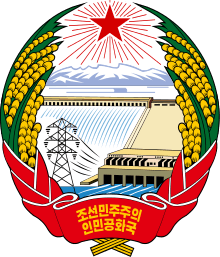Botswana–North Korea relations
Botswana |
North Korea |
|---|
Botswana–North Korea relations refers to the current and historical relationship between Botswana and the Democratic People's Republic of Korea (DPRK), commonly known as North Korea. Neither country maintains an embassy in their respective capitals, nor maintain any other form of diplomatic relation at this time.
History
The two countries established diplomatic ties on 27 November 1974, during the Cold War.[1] Botswana's first independent leader, President Seretse Khama, made a state visit to Pyongyang between 9 and 13 August 1976.[2] During the visit, he and his wife met with Kim Il-sung, who arranged a banquet for them.[3] Reportedly, Khama startled his hosts by playing billiards, at one point stretching across the pool table in a rather awkward position.[4]
In the early 1980s, several North Korean martial arts instructors were commissioned to train the Botswana Police Service in unarmed combat. The North Koreans left Botswana shortly after they arrived, apparently due to inciting the constables against their superiors, and trying to convince them to seek a more democratic form of police work.[5]
In modern times, North Korean constructors from the Mansudae Overseas Projects state company have built the Three Dikgosi Monument, located in Gaborone, depicting three tribal chiefs. The monument, inaugurated by President Festus Mogae in September 2005, has been the source of controversy.[6] Botswana has also attempted to hire North Korean medical professionals to supplement their own.[7]
In 2013, the Botswana government suspended bilateral cooperation with the DPRK due to concerns with the human rights situation in North Korea. On 20 February 2014 it subsequently continued this path, by fully terminating all diplomatic and consular relations with North Korea following a report by the United Nations Commission of Inquiry on Human Rights in North Korea. While condemning the government, Botswana expressed its "heartfelt sympathies" with the North Korean people.[8]
In October 2014 it was reported that North Korean representatives had used derogatory racial language towards Charles Thembani Ntwaagae, Botswana's Permanent Representative to the United Nations, referring to him as "that black bastard".[9]
See also
References
- ↑ Yonhap News Agency (2002). North Korea Handbook. Seoul: M. E. Sharpe. p. 967. ISBN 076-563-523-2.
- ↑ Asian Almanac. V.T. Sambandan. 1997. p. 8140.
- ↑ Summary of World Broadcasts: Far East, Part 3. London: British Broadcasting Corporation. 1976.
- ↑ Rotberg, Robert I. (2012). Transformative Political Leadership: Making a Difference in the Developing World. Chicago: University of Chicago Press. p. 86. ISBN 022-672-898-6.
- ↑ Franklin, Derek Peter (1996). A Pied Cloak: Memoirs of a Colonial Police Officer (special Branch), Kenya, 1953-66, Bahrain, 1967-71, Lesotho, 1971-75, Botswana, 1976-81. Cambridge: Janus Publishing Company. p. 157. ISBN 185-756-294-1.
- ↑ "North Korea built Three Dikgosi Monument Bashi Letsididi". Sunday Standard. Gaborone. 30 March 2014. Retrieved 5 January 2015.
- ↑ Connell, John (2010). Migration and the Globalisation of Health Care: The Health Worker Exodus?. Cheltenham: Edward Elgar Publishing. p. 213. ISBN 184-980-518-0.
- ↑ "Botswana Cuts Ties with North Korea". www.gov.bw. Ministry of Foreign Affairs and International Cooperation . 20 February 2014. Retrieved 5 January 2015.
- ↑ Oakford, Samuel (24 October 2014). "Sources Say North Korean Representatives Used Racist Slur at United Nation". Vice News. New York City. Retrieved 5 January 2015.
